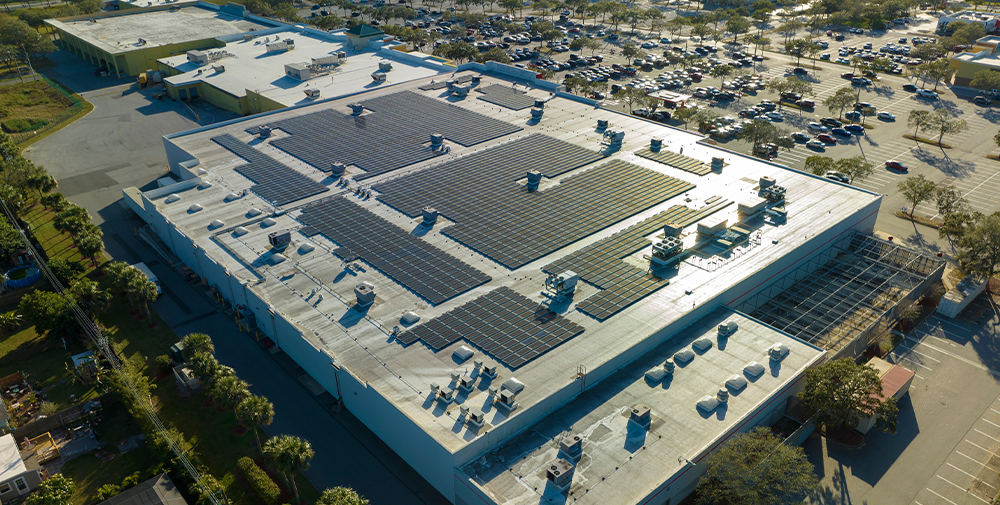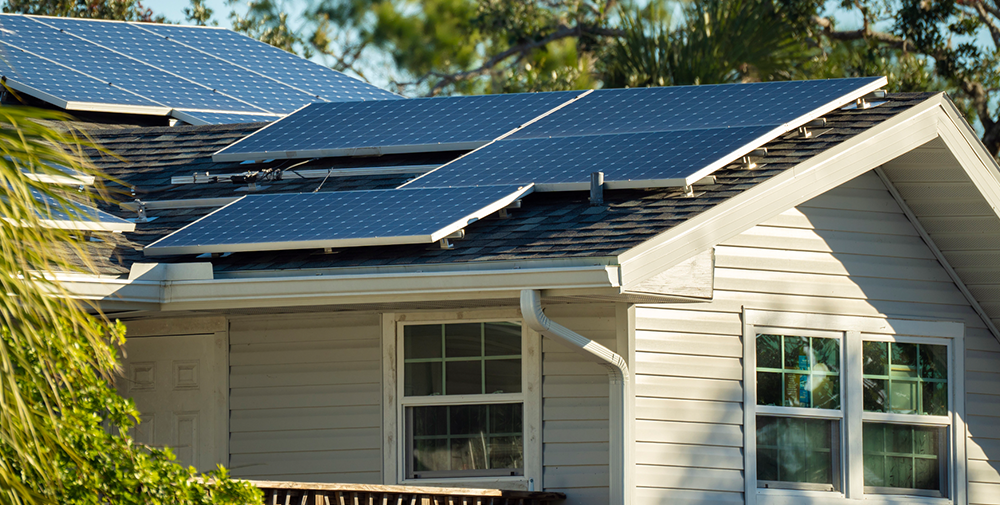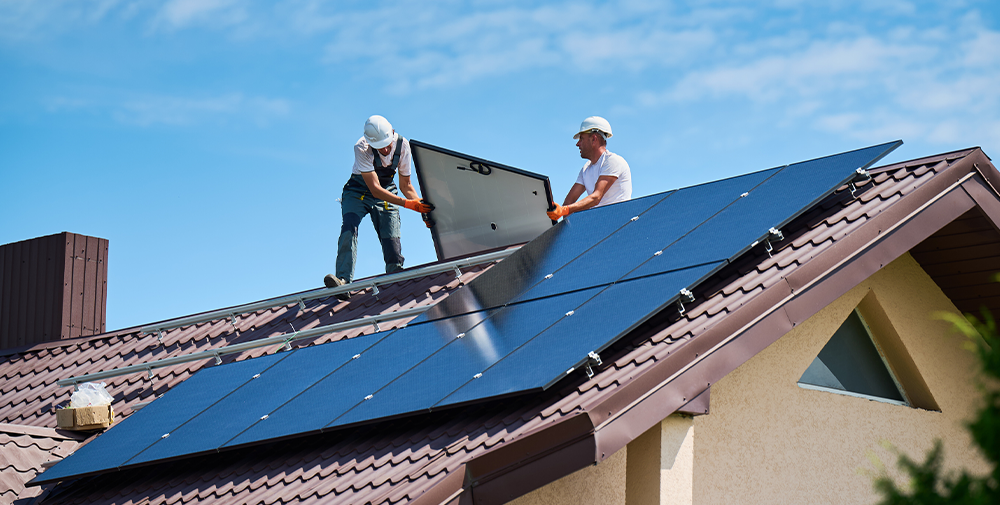What is solar generation?
Solar generation is a renewable source of energy that converts sunlight directly into electricity. This is typically achieved using photovoltaic (PV) panels that directly convert sunlight into electricity. The energy produced can be used at the time of generation, paired with battery storage to use later or exported to the electric grid.

What are the benefits of solar generation?
Solar generation systems paired with storage can improve energy resiliency, reduce reliance on fossil fuels, lower utility bills and lower your carbon footprint. Studies show that homeowners will pay more for a home equipped with solar panels. Solar generation can also contribute to a healthier environment by reducing greenhouse gas emissions and air pollutants. Benefits of solar are typically maximized when paired with battery energy storage systems.

Meet a portion of your energy needs with renewable solar power
Solar generation is a renewable source of energy that can help homes and businesses manage their electricity bill and lower their carbon footprint. With solar electric systems, sunlight is converted directly into electricity, allowing you to use the energy as it is produced or to export it to the grid. Solar arrays can be installed in many places, including on roofs, atop other structures like carports or pergolas, or on the ground. When paired with energy storage systems, excess solar energy can be stored for later use, increasing the amount of solar you use in your home or business.

What size solar system do you need?
When sizing your solar photovoltaic (PV) system, it’s important to balance factors like total cost, monthly payments and your goals for offsetting energy from the grid. Solar systems are designed to meet a percentage of your household’s annual energy needs, but production can vary due to weather and time of day. Your home or business will remain connected to your local utility provider to ensure consistent and reliable electricity.

Solar is part of a bigger picture
While solar and storage are powerful tools for reducing carbon emissions and increasing energy resilience, they are just one part of a diverse energy system. A reliable, 100% noncarbon electric grid also depends on other technologies like wind, long-duration storage and virtual power plants. Even with solar panels, most homes and businesses remain connected to the grid to ensure consistent power, especially when the sun isn’t shining. That’s why we’re investing in a balanced mix of resources to meet our community’s energy needs reliably and sustainably.


Curious about solar? Explore the potential for your home or business with the Colorado Solar & Storage Association—a free resource to find qualified professionals, understand costs, and explore financing options.
Making solar more affordable
Federal incentives may be available in the form of Residential Energy tax credits, Clean Energy tax incentives and federal investment tax credits (ITC). These can help offset the costs of solar PV installation for your home or business. A tax credit reduces your tax liability. State property tax exemptions for residential renewable energy may also be available. For homeowners, this can result in a dollar-for-dollar reduction in taxes owed. Businesses and nonprofit organizations may be eligible for tax credits that reduce federal income tax liability for a percentage of the cost of the solar system and even a per-kilowatt-hour credit based on the amount of electricity generated. For more information about the available federal incentives and eligibility requirements, explore the information below.


Frequently asked questions

What are the benefits of installing a solar energy system?
Solar energy systems paired with storage can improve energy resiliency, reduce utility bills and lower your carbon footprint. Studies show that homeowners will pay more for a home equipped with solar panels.

What happens when there’s not enough solar energy to meet my needs?
Solar panels produce electricity only when the sun is shining, so their output decreases at night or on cloudy days. Sometimes they generate more energy than you use, and other times they fall short. While the grid can absorb excess energy or supply power when needed, this creates additional strain and costs. By adding battery storage, you can store surplus solar energy for later use, reducing your reliance on the grid and making the most of your solar investment. Learn more about energy storage here.

What incentives are available for solar installations in Colorado?
At this time, there are no statewide incentives for solar installation, though some tax exemptions are available for certain groups through the Colorado Department of Local Affairs. However, federal solar tax credits are available for both homeowners and businesses. In addition, Fort Collins and Boulder County offer incentives.

How do I know if my home or business is suitable for solar?
A solar assessment will determine your property’s solar potential, considering factors like roof orientation, shading, and energy needs. Typically, solar panels are best suited for some southern exposure, though others may be suitable too. You can also consult tools like Project Sunroof.

What is net metering, and how does it work?
Net metering is a billing mechanism that combines a customer’s load with the output of their solar and storage system behind the utility’s electric meter. A net metering rate applies to this total metered value. The precise details of the rate and how it is applied are determined by the retail electric utility.
Solar generation resources

Federal tax incentives – Residential
Information on the Residential Clean Energy Credit, which provides a tax credit for homeowners investing in solar technology.

Federal tax incentives – Commercial
Information on Clean Energy Tax Incentives for Businesses, which includes several tax credits for businesses investing in clean energy projects. Visit IRS.gov/CleanEnergy for additional details.

Town of Estes Park
Information on solar energy, including guidance on how to get started with solar power, available incentives and steps for connecting to the grid.

City of Fort Collins
Details on solar rebate programs, including eligibility requirements, rebate amounts and application processes for solar installations. Homeowners in Fort Collins may also wish to explore an Epic Homes Loan, which may be used to finance energy efficiency upgrades.

City of Longmont
Guidance on how residents can install solar panels, net metering options and the benefits of solar energy for homes and businesses.

City of Loveland
Resources for residents interested in rooftop solar, including guidelines for installation, net metering policies and connecting to the electric grid.

Colorado Solar and Storage Association
The Colorado Solar and Storage Association (COSSA) is a nonprofit dedicated to advancing Colorado’s solar and energy storage industries. They offer resources such as a member directory, policy initiatives, and industry events to support professionals and consumers in adopting renewable energy solutions.

Boulder County Partners for a Clean Environment (PACE)
Offers support and incentives for Boulder County businesses and residents interested in solar energy.

